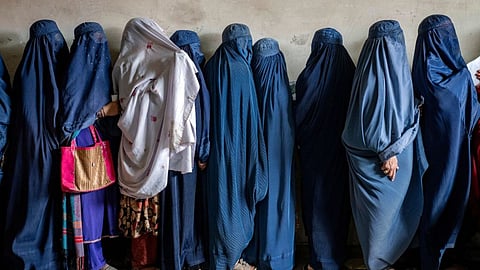
- NEWS
- the EDIT
- COMMENTARY
- BUSINESS
- LIFE
- SHOW
- ACTION
- GLOBAL GOALS
- SNAPS
- DYARYO TIRADA
- MORE

The Taliban government in Afghanistan has recently imposed harsh new laws that further curtail the rights and freedoms of women, marking a significant escalation in their ongoing campaign to enforce a strict interpretation of Sharia law. These measures, part of a 114-page document released by the Taliban’s Ministry for the Propagation of Virtue and the Prevention of Vice, include severe restrictions such as mandating women to cover their entire bodies, including their faces, and forbidding them from speaking, singing, or reading aloud in public.
The new laws, approved by Taliban leader Hibatullah Akhundzada, are among the most oppressive since the group seized power in August 2021. These decrees also prohibit women from looking at men who are not their close relatives, while men face restrictions such as a ban on wearing ties or shaving their beards too closely. Additionally, the laws impose bans on music, the mixing of men and women in public, and the publication of images of living beings—further tightening the Taliban’s control over Afghan society.
International condemnation of these new laws has been swift, with critics describing them as a form of gender apartheid that strips Afghan women of basic human rights, including education, work, and freedom of expression. Prominent figures, such as Australian Senator Penny Wong, have voiced strong opposition, urging global action to support the rights of Afghan women and girls. Amnesty International has labeled the situation as gender persecution, warning that it could constitute a crime against humanity.
The Taliban’s Ministry for the Propagation of Virtue and the Prevention of Vice, responsible for enforcing these draconian rules, has created what the United Nations describes as a "climate of fear" across Afghanistan. The ministry’s growing influence has raised concerns about the future of human rights in the country, particularly for women and other marginalized groups. A recent UN report highlighted the increased role of the morality police, who have been granted broad powers to interpret and enforce these laws as they see fit, leading to an unpredictable and deeply disturbing environment for Afghan women.
As Afghan women despair over these escalating restrictions, activists and international organizations continue to call for global solidarity in supporting their rights. The UN’s special rapporteur on Afghanistan, Richard Bennett, was recently barred from entering the country after issuing a scathing report on the Taliban's treatment of women, further highlighting the regime’s disregard for international criticism.
The Taliban’s new laws are a chilling reminder of their first time in power during the 1990s, when women were completely excluded from public life. Despite earlier promises of a more moderate approach, the reality under Taliban rule has been a relentless assault on women’s rights, with each new decree pushing Afghan women further into the margins of society.
With the situation in Afghanistan growing increasingly dire, the international community faces a critical test in how it will respond to the Taliban’s systematic erasure of women’s rights. The need for global action has never been more urgent.
(Sources: Indian Express; Agence France-Presse; The National News; Amnesty International)
